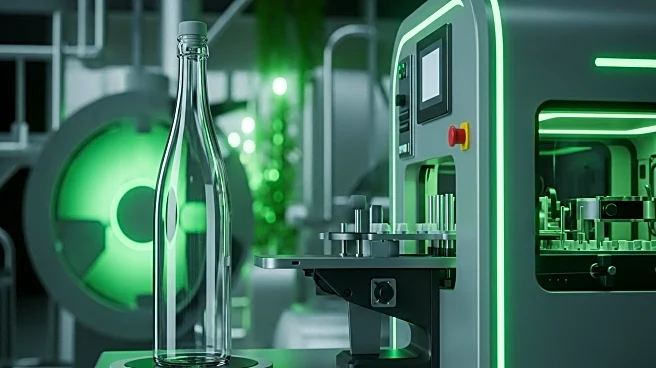What's Happening?
Recent technological advancements are significantly enhancing sustainability in the beverage processing and packaging industry. Companies like Porifera, Ecolab, Sidel, and Husky are leading the charge with innovative solutions. Porifera has launched Draftfox, a system that uses Forward Osmosis technology to concentrate beer, reducing its volume and making it easier to transport while maintaining flavor. Ecolab is utilizing AI to improve water consumption efficiency, reporting a 10% reduction in water use. Sidel has introduced the EvoBlow Laser, a laser-powered solution for PET packaging that increases precision and reduces resource waste. Husky's HyPET6e platform offers advanced vacuum drying technology for recycled PET, enhancing energy efficiency and material protection. These innovations are showcased at drinktec, a major platform for new technology in the beverage industry.
Why It's Important?
These technological advancements are crucial for the beverage industry as they address both environmental and economic challenges. By reducing water and energy consumption, companies can lower operational costs and minimize their environmental footprint. The use of AI and advanced materials technology not only improves efficiency but also aligns with global sustainability goals. This shift towards more sustainable practices is likely to influence industry standards and consumer expectations, as there is increasing demand for environmentally friendly products. Companies that adopt these technologies may gain a competitive edge by appealing to eco-conscious consumers and reducing regulatory risks associated with environmental impact.
What's Next?
As these technologies gain traction, the beverage industry may see a broader adoption of sustainable practices. Companies might invest more in R&D to further enhance efficiency and sustainability. Regulatory bodies could also play a role by incentivizing sustainable practices or imposing stricter environmental standards. The success of these technologies could encourage other industries to explore similar innovations, potentially leading to a wider impact on global sustainability efforts. Stakeholders, including consumers, environmental groups, and policymakers, will likely monitor these developments closely to assess their effectiveness and scalability.
Beyond the Headlines
The move towards sustainability in the beverage industry could have long-term cultural and ethical implications. As consumers become more aware of environmental issues, there may be a shift in purchasing behavior towards brands that prioritize sustainability. This could lead to a cultural change where sustainability becomes a key factor in brand loyalty and consumer trust. Ethically, companies may face increased pressure to not only adopt sustainable practices but also to be transparent about their environmental impact. This transparency could foster greater accountability and drive further innovation in sustainable technologies.










